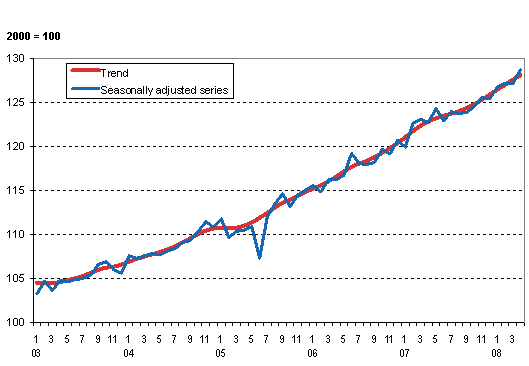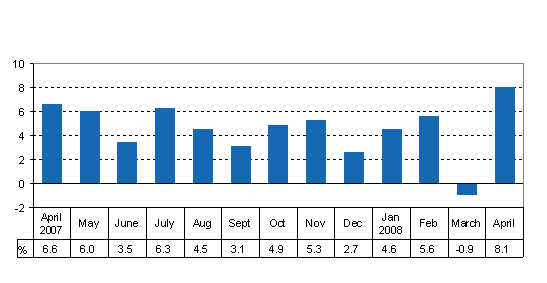Published: 8 July 2008
Output of the national economy grew in April
Seasonally adjusted output rose by 1.2 per cent in April from the month before. Year-on-year the increase amounted to 8.1 per cent according to original series. April 2008 had tree working days more than the comparison month of the previous year. Adjusted for working days, the year-on-year growth was 5.1 per cent. The data derive from Statistics Finland's Trend Indicator of Output.
Volume of total output 2003 - 2008, trend and seasonally adjusted series

The series of the Trend Indicator of Output are seasonally
adjusted with the Tramo/Seats method. The latest observations of
the series adjusted for seasonal and random variation (seasonally
adjusted and trend series) become revised with new observations in
seasonal adjustment methods.
Percentage changes of total output from previous year's corresponding month

Secondary production is estimated to have gone up by 15 per cent and services by just short of five per cent from April of the previous year. Adjusted for working days, secondary production grew by under 10 per cent and services by under three per cent. Primary production went up by eight per cent from its level in April 2007, but by good five per cent when adjusted for working days. Secondary production includes manufacturing and construction. Services comprise trade, hotel and restaurant activities, transport and business activities as well as real estate, renting and research activities, financial intermediation and insurance, and public services. Primary production refers to agriculture, forestry and fishery.
The former Monthly Indicator of Total Output is being revised
Starting from the February release, these statistics are published as the Trend Indicator of Output. The calculation of the indicator has been harmonised with the calculation methods of quarterly accounts output, and the development work will continue in 2008. The calculation of industry-specific data is now primarily based on value data, deflated with previous year's average prices. This produces volume figures at previous year's prices, in which the previous year is always the base year. Volume changes at previous year's prices are used to chain a continuous volume series at reference year 2000 prices with the so-called annual overlap method. This series is published as the Trend Indicator of Output. This method corresponds to the deflation and chaining method applied to quarterly accounts output. In this publication the calculation of value data is based on 54 sources and the description of price development on 55 sources. The time series have been completely revised from 1996 onwards in accordance with the new sources and methods.
The volume of the source data used in the calculation of the Trend Indicator of Output has been increased significantly and the calculation is performed at a more detailed level than before (2-digit level of the Standard Industrial Classification). The publication level is primary production, secondary production and services. In the published indicator a considerable proportion of the source data used in the calculation has been changed to comply with the revised quarterly accounts. As a rule, the source data used for manufacturing and private services are preliminary data from indices of turnover. Development work still continues for the other industries.
Source: Trend Indicator of Output 2008, April Statistics Finland
Inquiries: Mr Veli-Pekka Karvinen +358 9 1734 2667, Mr Samu Hakala +358 9 1734 3756 kansantalous.suhdanteet@stat.fi
Director in charge: Mr Ari Tyrkkö
- Tables
-
Tables in databases
Pick the data you need into tables, view the data as graphs, or download the data for your use.
Last updated 8.7.2008
Official Statistics of Finland (OSF):
Trend Indicator of Output [e-publication].
ISSN=1798-5439. April 2008. Helsinki: Statistics Finland [referred: 19.2.2026].
Access method: http://stat.fi/til/ktkk/2008/04/ktkk_2008_04_2008-07-08_tie_001_en.html

